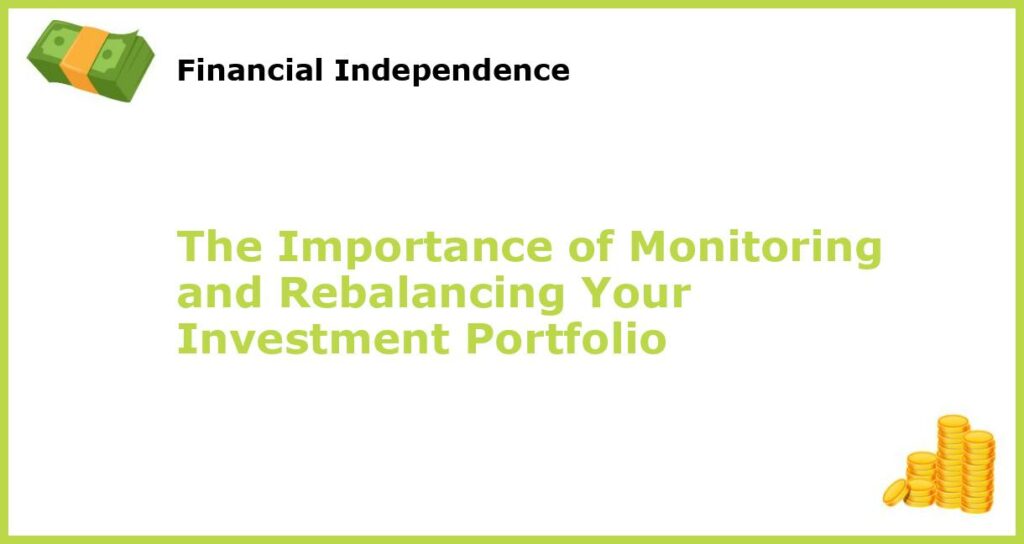Investing your money can be a lucrative way of growing your wealth over time. However, investing success is not dependent only on simply putting in money in a particular fund or set of funds, and then forgetting about it forever. It is crucial to monitor and rebalance your investment portfolio regularly. By doing so, you can ensure the investment is working towards your financial goals, reducing investment risks and increasing the potential for higher returns.
Why Monitoring and Rebalancing is Important

Investors need to understand that the market is constantly changing, and so does their investment portfolio. The importance of monitoring and rebalancing lies in the fact that these activities enable investors to realign their portfolio’s asset allocation with their investment objectives, risk tolerance, and financial situation regularly. It helps to keep the portfolio in a better position to achieve sustained growth over time. When investors ignore regular monitoring and rebalancing, they risk losses due to dilution of the original investment purpose.
The Benefits of Regular Monitoring

Regular monitoring is an essential element of successful investment management. It helps investors stay informed about investment funds’ progress and vital signs. In case conditions change, investors can take quick decisions based on the latest information available rather than older information. Regular monitoring helps investors to adjust their investments to market changes and grasp opportunities for gain. Over time, based on these adjustments, the investor can achieve their financial goals by continuing to assess their portfolio’s performance and making the necessary changes.
The Dangers of Ignoring Your Portfolio

Ignoring your portfolio for extended periods can lead to negative consequences. The longer events go unattended, the more substantial the losses investors may face. Ignoring the portfolio also implies that investors may bear too much risk that is unsuitable for their goals or that the portfolio may underperform. By keeping an eye on the portfolio, it enables investors to course-correct from time to time, helping them meet their financial objectives.
How Rebalancing Works

Rebalancing your portfolio is a process that enables investors to invest in their financial goals while managing investment risks. When there is a deviation from the target asset allocation, rebalancing seeks to restore the intended target mix by buying or selling investments in the portfolio. For instance, if stocks perform exceptionally well, a portfolio with a 50/50 split between equities and bonds could become split 60/40.
Hence, rebalancing the portfolio to follow the original 50/50 split helps avoid significant losses due to overexposure in one asset class. During the rebalancing process, the portfolio’s weights will be reset to the intended strategic allocation, thereby minimizing risk and increasing returns in the long run.
Determining Your Ideal Asset Allocation
Determining an ideal asset allocation means following a disciplined process to evaluate the investor’s financial goals along with their timelines to achieve those goals. High-risk investments generate more returns in the short term, measured in years or even months. But low-risk investments generate stable results, ensuring long-term financial strategies. Investors may employ various techniques to develop an optimal asset allocation, such as a professional adviser’s help, self-testing tools, or a calculated balance of asset classes.
Timing Your Rebalancing
Rebalancing is advisable whenever the portfolio deviates significantly from the desired allocation. Investors shouldn’t rebalance too often, as it could lead to incurring excessive costs while creating taxable events. Generally, market changes that affect the original asset allocation by 20% or more call for rebalancing. Sometimes nearing an annual anniversary, investors may plan for a scheduled time to review their investment portfolio to rebalance it, to help ensure that their investments meet their long-term financial strategy.
Common Rebalancing Mistakes to Avoid
Rebalancing mistakes emerge when investors behave haphazardly based on emotions, speculation, or guesswork. Many investors rebalance their portfolios frequently, which increases the cost of repositioning investments within the portfolio. Some investors also forget about tax implications with regards to rebalancing. So, It is crucial to have a well-understood rebalancing strategy—mistakes can cause expensive taxable events in the form of capital gains on shares.
The Role of Technology in Monitoring and Rebalancing
The rise in digital technology has made investment monitoring and rebalancing less troublesome than before. With online tools at investors’ disposal, they can track their investment in real-time and decide which investments to buying, and sell all with only a few clicks on the smartphone. This availability of digital technology made it easier to monitor portfolios in real-time, making it possible to make strategic decisions promptly. Your investment adviser, broker, or personal banker can assist you in assessing the best technology monitoring tools to use.
The Bottom Line
Rebalancing should be part of every investor’s routine to stay aligned with their investment goals from a long-term viewpoint. Regular monitoring of investment risks and rewards, combined with suitable rebalancing, is essential for portfolio success. Investors can prevent their portfolio from drifting too far from treasure targets by adjusting them with proper monitoring and rebalancing. A well-executed rebalancing strategy not only minimizes the risks in the portfolio but also maximizes its potential returns over time.







